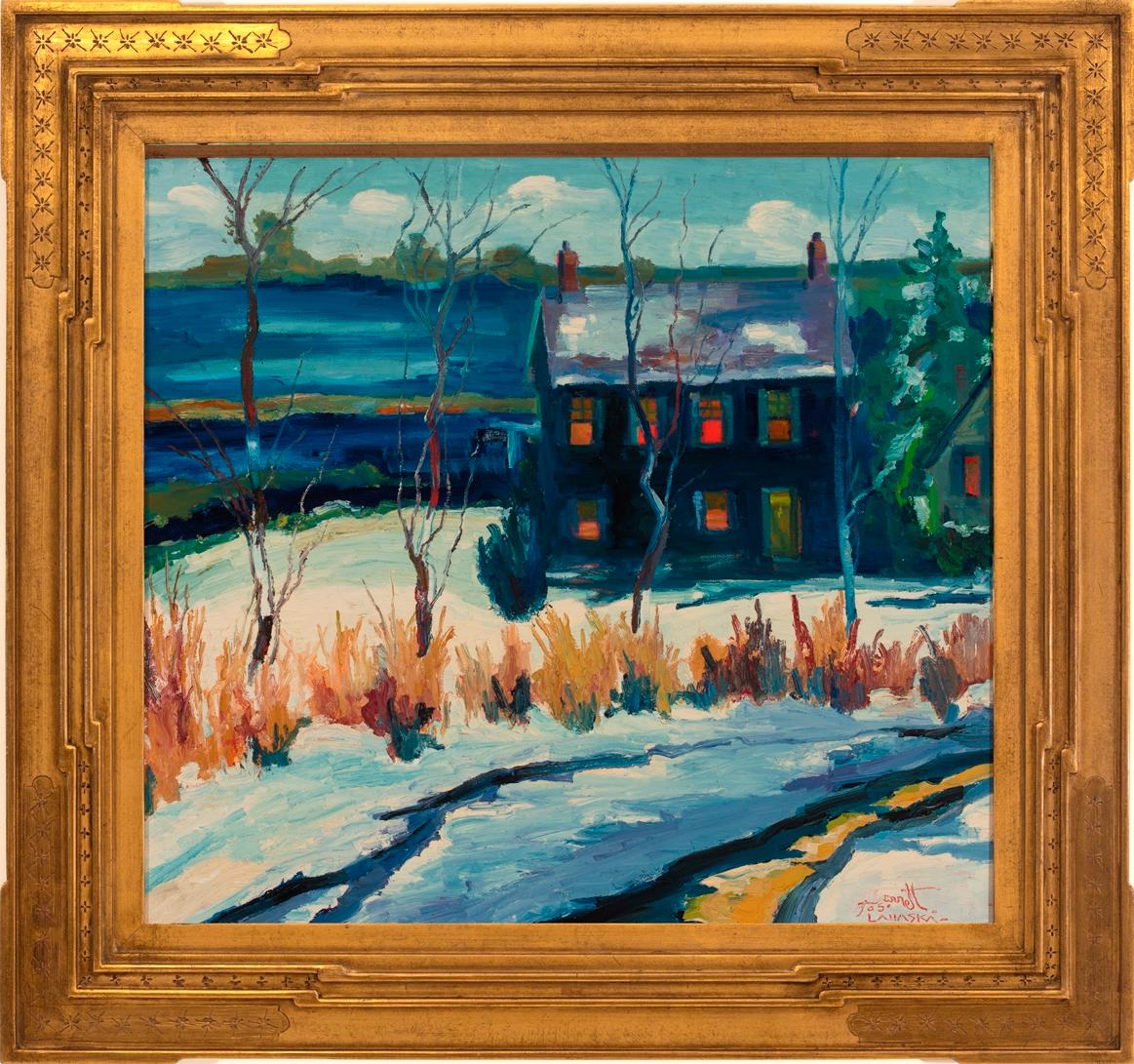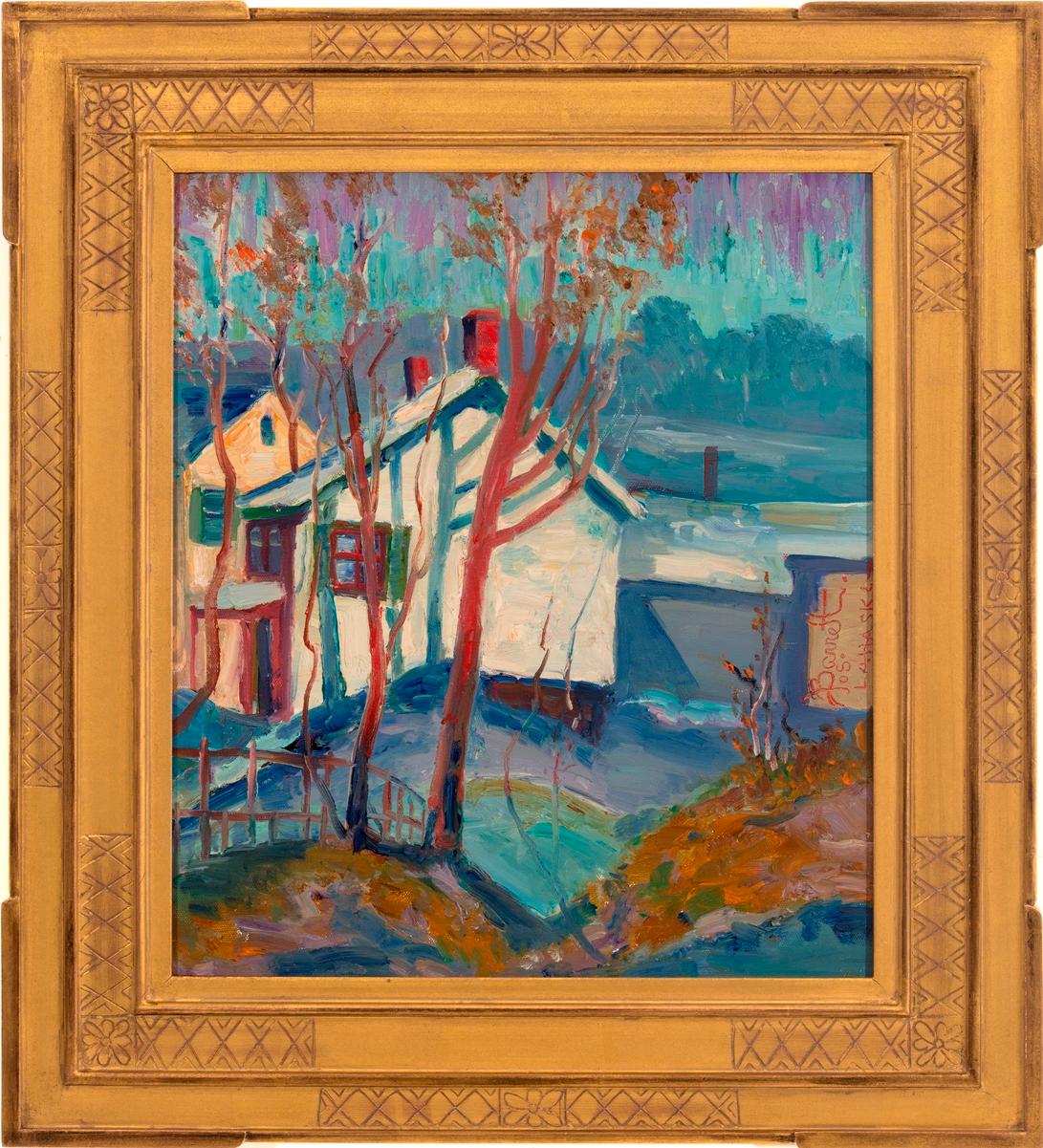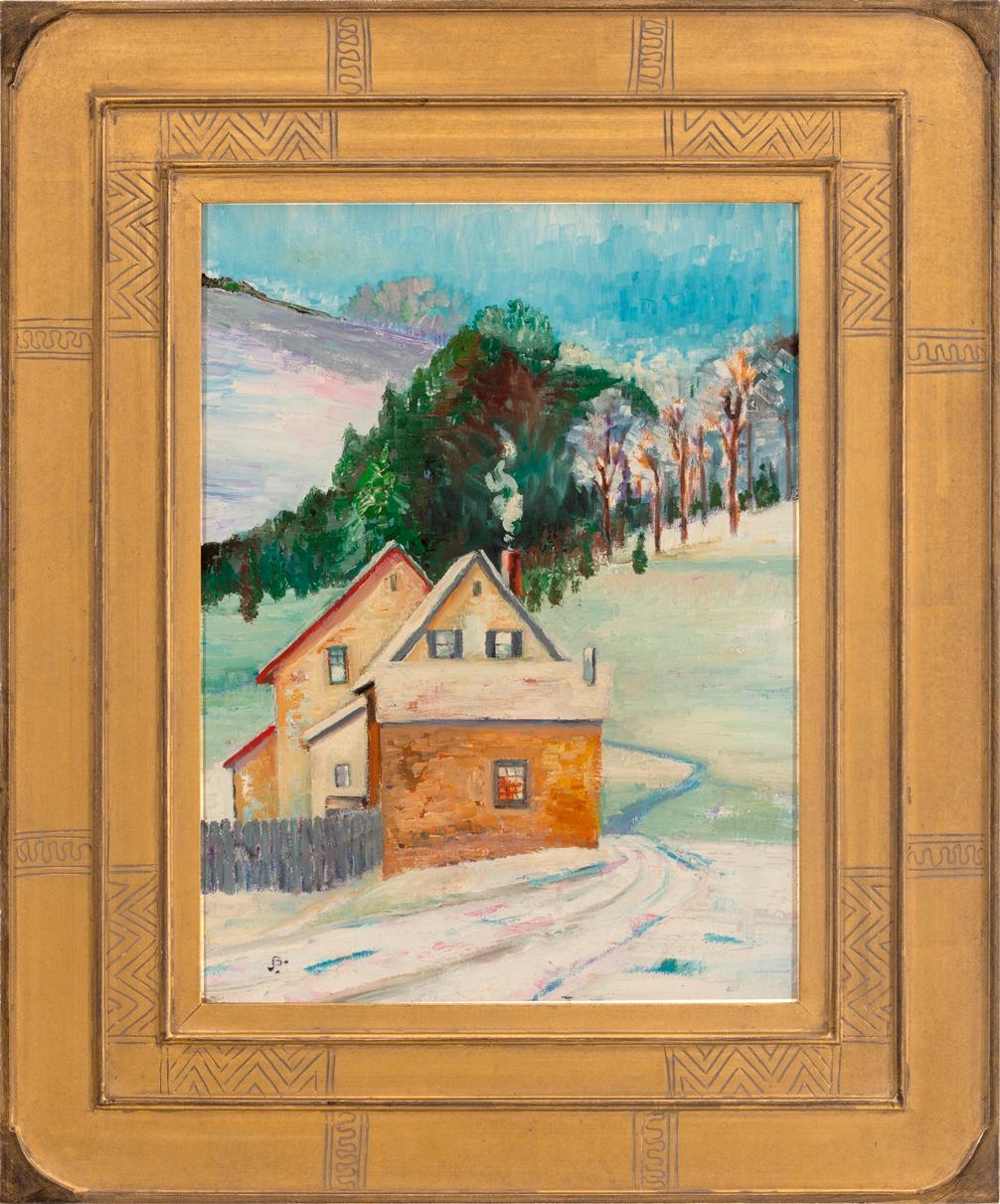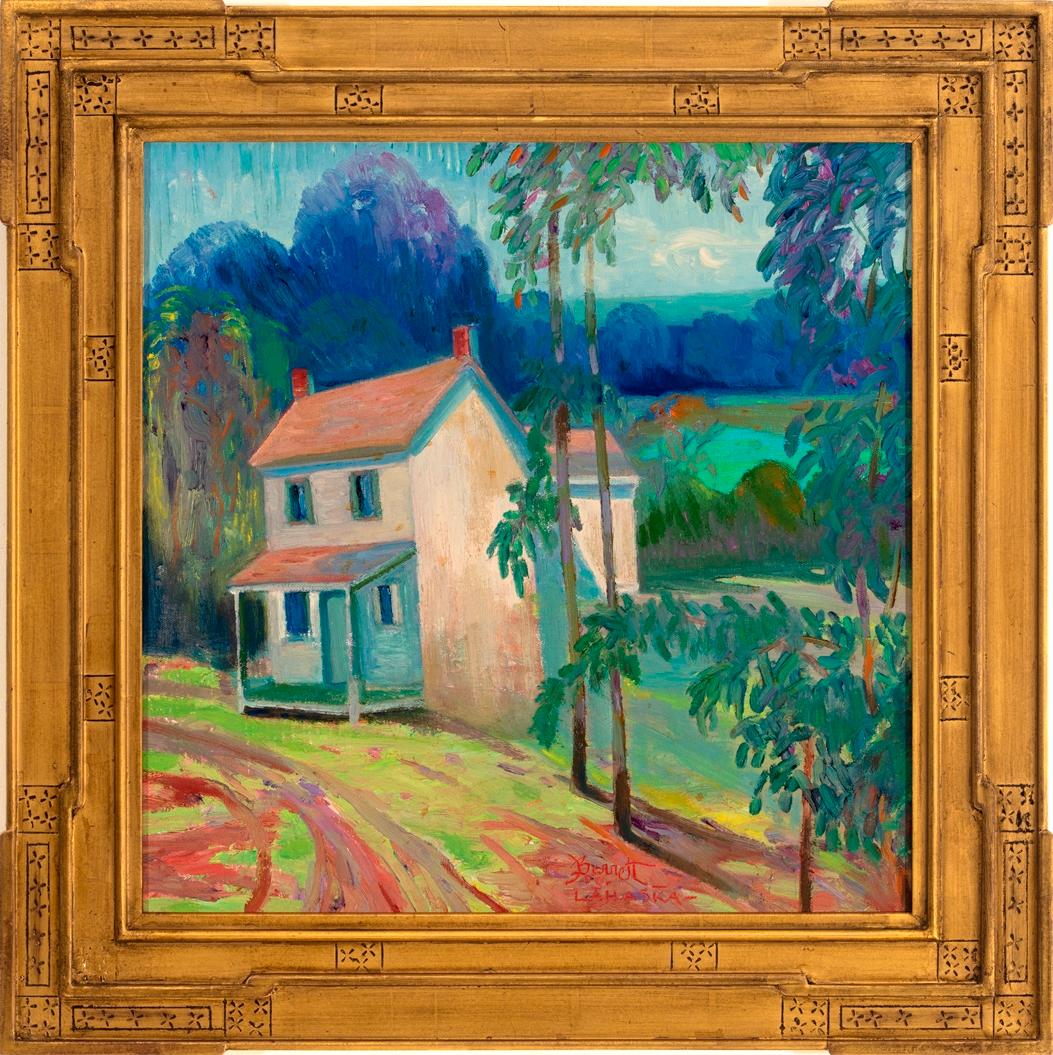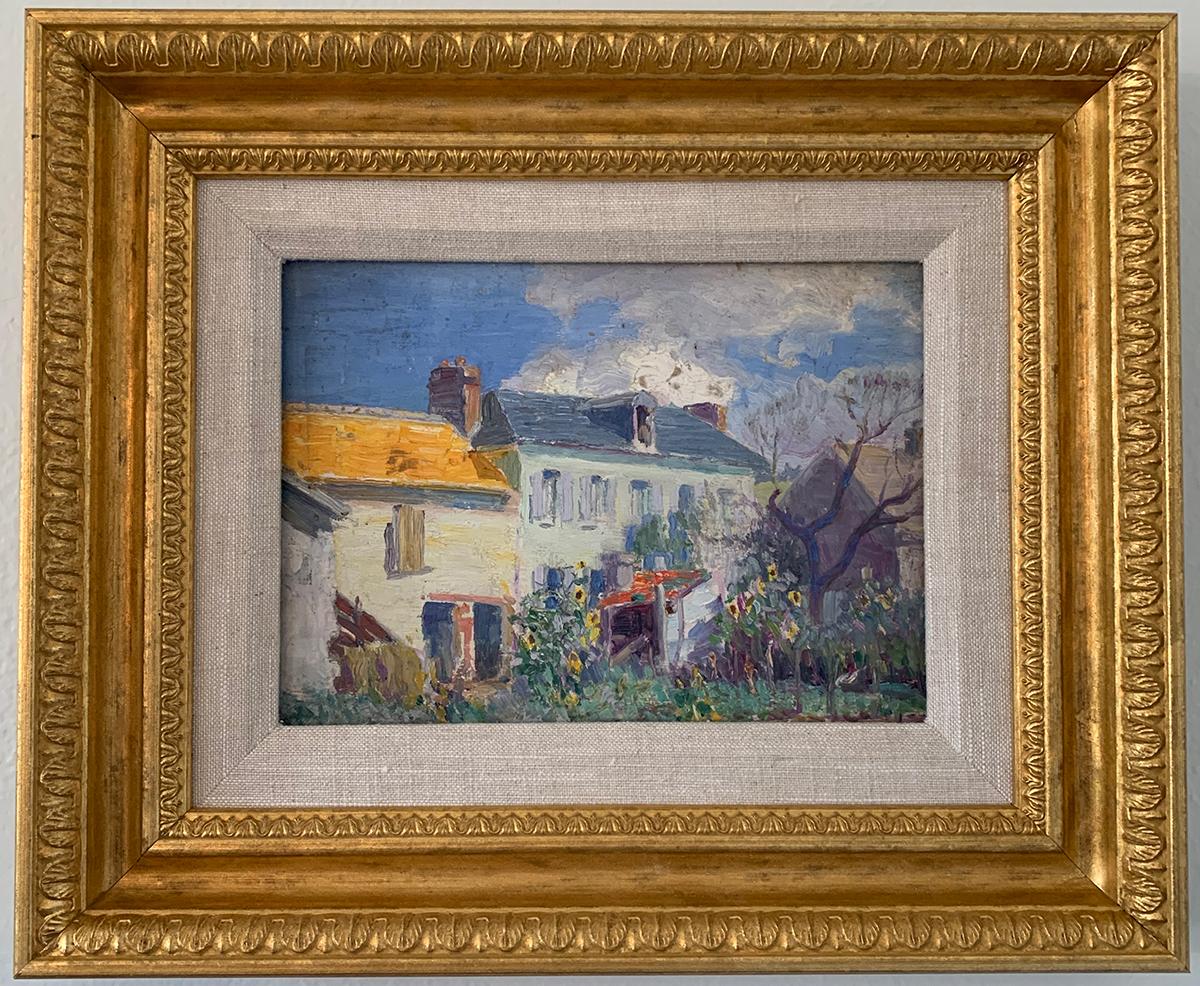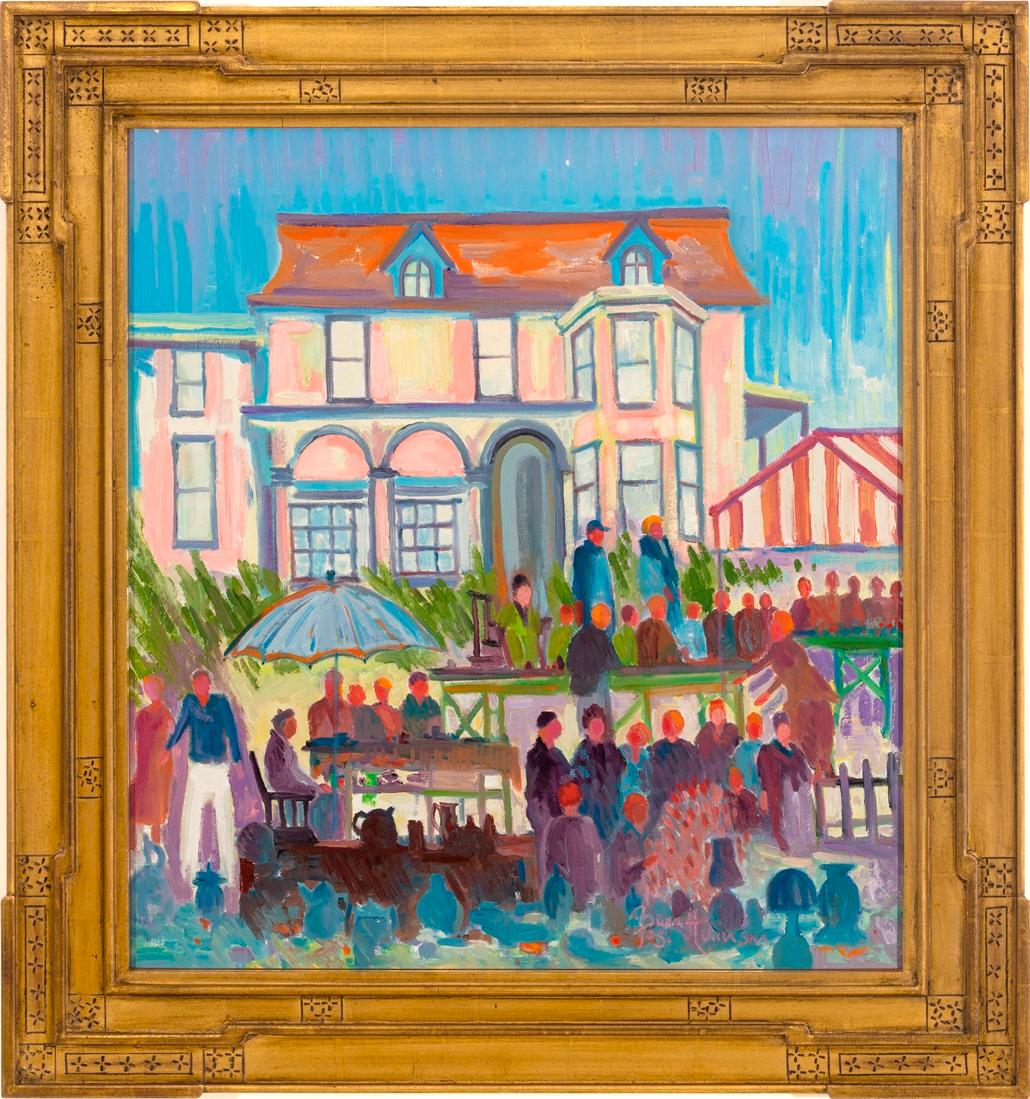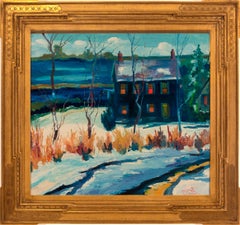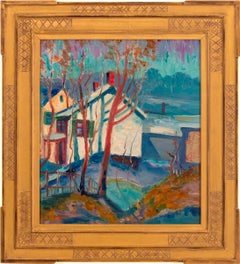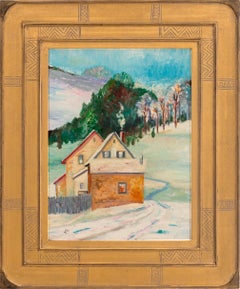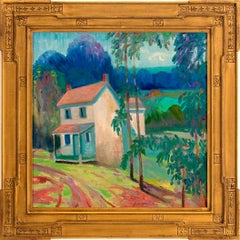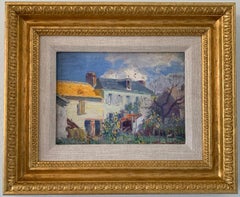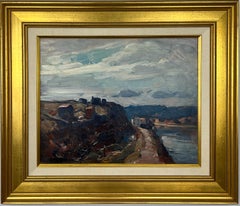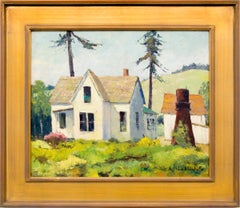Items Similar to "Study for Lone House"
Want more images or videos?
Request additional images or videos from the seller
1 of 5
John R. Grabach"Study for Lone House"
$12,350
£9,399.34
€10,764.83
CA$17,565.89
A$19,249.70
CHF 10,052.59
MX$231,328.79
NOK 125,674.92
SEK 118,531.47
DKK 80,347.45
About the Item
Jim’s of Lambertville is proud to offer this artwork.
Signed lower center.
Complemented by hand carved frame.
John R. Grabach (1886 - 1981)
John Grabach was a highly regarded New Jersey artist, teacher and author of a classic text, How to Draw the Human Figure. He was born in Massachusetts, and with his widowed mother, moved to Newark, New Jersey when he was eleven. Starting out as a die cutter for a New Jersey silverware firm, Grabach also designed important works of sterling silver hollow ware and Art Deco glass designs for several high end retail manufacturers. He designed United States stamps for the Treasury Department and designed holiday greeting cards for several firms. Grabach enrolled in courses at the Art Students League in his spare time studying under George Bridgeman, Frank Dumond and Kenyon Cox and H. August Schwabe.
Considered a leading figure among the Newark School of Painters, his powerful ashcan style paintings depicting scenes of New York City and Newark are truly American masterpieces. He captures the expressions and mood of his subjects in these complex compositions on par with any of the so called American masters of this period. Similar in many ways to his contemporary, George Bellows, Grabach was gifted in portraying the everyday events of working class folks, and translating their ordinary daily routines into something extraordinary to look out.
Whether it be his native blue collar Newark neighborhood, a crew of gruff dockworkers or something as regular an uninteresting as men eating soup, John Grabach had the ability to turn virtually any subject into appealing and worthy art.
From the 1920’s through the 1960’s, Grabach was the subject of numerous one-man exhibitions in prestigious galleries and institutions across the country. In 1980, The Smithsonian, in Washington, D.C. honored Grabach with a solo retrospective show of his work. This was an unusual tribute for a still living artist.
Grabach was a dedicated and beloved teacher at the Newark School of Industrial Design for many years and among his favorite students was Henry Gasser. Grabachs’ work is in the permanent collections of the Smithsonian, The Corcoran Gallery of Art, the Art Institute of Chicago, and the Philadelphia Art Alliance among many others.
Sources: New Hope for American Art by James M. Alterman
- Creator:John R. Grabach (1886 - 1981, American)
- Dimensions:Height: 17 in (43.18 cm)Width: 18 in (45.72 cm)Depth: 2 in (5.08 cm)
- More Editions & Sizes:Frame Size 17" x 18" x 1.5"Price: $12,350
- Medium:
- Movement & Style:
- Period:
- Condition:
- Gallery Location:Lambertville, NJ
- Reference Number:Seller: JOL11112016071stDibs: LU3741446213
About the Seller
5.0
Vetted Professional Seller
Every seller passes strict standards for authenticity and reliability
Established in 1997
1stDibs seller since 2014
39 sales on 1stDibs
Typical response time: 1 to 2 days
- ShippingRetrieving quote...Shipping from: Lambertville, NJ
- Return Policy
Authenticity Guarantee
In the unlikely event there’s an issue with an item’s authenticity, contact us within 1 year for a full refund. DetailsMoney-Back Guarantee
If your item is not as described, is damaged in transit, or does not arrive, contact us within 7 days for a full refund. Details24-Hour Cancellation
You have a 24-hour grace period in which to reconsider your purchase, with no questions asked.Vetted Professional Sellers
Our world-class sellers must adhere to strict standards for service and quality, maintaining the integrity of our listings.Price-Match Guarantee
If you find that a seller listed the same item for a lower price elsewhere, we’ll match it.Trusted Global Delivery
Our best-in-class carrier network provides specialized shipping options worldwide, including custom delivery.More From This Seller
View All"House, Lahaska"
By Joseph Barrett
Located in Lambertville, NJ
Illustrated in "Joseph Barrett, The Prime Years 1970s - 1990s", pg. 7 #007
Jim’s of Lambertville is proud to offer this artwork by:
Joseph Barrett (1936 – )
Joseph Barrett wa...
Category
Late 20th Century American Impressionist Landscape Paintings
Materials
Canvas, Oil
"Cottage in Lahaska"
By Joseph Barrett
Located in Lambertville, NJ
Illustrated in "Joseph Barrett, The Prime Years 1970s - 1990s", pg. 10 #011
Jim’s of Lambertville is proud to offer this artwork by:
Joseph Barrett (1936 – )
Joseph Barrett was born in Midland, North Carolina, in 1936 and studied at the Massachusetts College of Art in Boston and at the Tyler School of Art in Philadelphia. Barrett, now of Lahaska, Pennsylvania, has been painting his entire adult life. His favorite subjects include the landscape surrounding New Hope and many local landmarks often encompassing figures into his compositions. Barrett utilizes a heavy impasto and his palette bears similarities to that of Fern Coppedge and George Sotter. Barrett’s paintings are always found in unique and somewhat charming handmade frames designed by the artist and finished in metal leaf.
A living contemporary of the no longer living “New Hope School” impressionist painters, Joseph Barrett resides outside of New Hope above his old-fashioned antique shop and studio. Entering Barrett’s shop is like taking a step back in time. Inside this cluttered and dusty haven of treasures from the past, is a studio spanning only four by eight feet. This little studio, containing cans of old brushes and hundreds of used paint tubes...
Category
Late 20th Century American Impressionist Landscape Paintings
Materials
Canvas, Oil
"Group of Old Houses, Buckingham"
By Joseph Barrett
Located in Lambertville, NJ
Illustrated in "Joseph Barrett, The Prime Years 1970s - 1990s", pg. 64, plate #075.
Jim’s of Lambertville is proud to offer this artwork by:
Joseph Barrett (1936 – )
Joseph B...
Category
Late 20th Century American Impressionist Landscape Paintings
Materials
Canvas, Oil
"Abandoned Farm House"
By Joseph Barrett
Located in Lambertville, NJ
Illustrated in "Joseph Barrett, The Prime Years 1970s - 1990s", pg. 36, plate #041.
Jim’s of Lambertville is proud to offer this artwork by:
Joseph Barrett (1936 – )
Joseph B...
Category
Late 20th Century American Impressionist Landscape Paintings
Materials
Canvas, Oil
"Vanderbilt House, Lahaska"
By Joseph Barrett
Located in Lambertville, NJ
Illustrated in "Joseph Barrett, The Prime Years 1970s - 1990s", pg. 25 plate #028.
Jim’s of Lambertville is proud to offer this artwork by:
Joseph Barrett (1936 – )
Joseph Barrett was born in Midland, North Carolina, in 1936 and studied at the Massachusetts College of Art in Boston and at the Tyler School of Art in Philadelphia. Barrett, now of Lahaska, Pennsylvania, has been painting his entire adult life. His favorite subjects include the landscape surrounding New Hope and many local landmarks often encompassing figures into his compositions. Barrett utilizes a heavy impasto and his palette bears similarities to that of Fern Coppedge and George Sotter. Barrett’s paintings are always found in unique and somewhat charming handmade frames designed by the artist and finished in metal leaf.
A living contemporary of the no longer living “New Hope School” impressionist painters, Joseph Barrett resides outside of New Hope above his old-fashioned antique shop and studio. Entering Barrett’s shop is like taking a step back in time. Inside this cluttered and dusty haven of treasures from the past, is a studio spanning only four by eight feet. This little studio, containing cans of old brushes and hundreds of used paint tubes...
Category
Late 20th Century American Impressionist Landscape Paintings
Materials
Canvas, Oil
"Edge of the Village"
By Joseph Barrett
Located in Lambertville, NJ
Illustrated in "Joseph Barrett, The Prime Years 1970s - 1990s", pg. 60, plate #070.
Jim’s of Lambertville is proud to offer this artwork by:
Joseph Barrett (1936 – )
Joseph Barrett was born in Midland, North Carolina, in 1936 and studied at the Massachusetts College of Art in Boston and at the Tyler School of Art in Philadelphia. Barrett, now of Lahaska, Pennsylvania, has been painting his entire adult life. His favorite subjects include the landscape surrounding New Hope and many local landmarks often encompassing figures into his compositions. Barrett utilizes a heavy impasto and his palette bears similarities to that of Fern Coppedge and George Sotter. Barrett’s paintings are always found in unique and somewhat charming handmade frames designed by the artist and finished in metal leaf.
A living contemporary of the no longer living “New Hope School” impressionist painters, Joseph Barrett resides outside of New Hope above his old-fashioned antique shop and studio. Entering Barrett’s shop is like taking a step back in time. Inside this cluttered and dusty haven of treasures from the past, is a studio spanning only four by eight feet. This little studio, containing cans of old brushes...
Category
Late 20th Century American Impressionist Landscape Paintings
Materials
Canvas, Oil
You May Also Like
'Impressionist Landscape with House' by Arthur Schneider, Oil on Canvas
Located in Oklahoma City, OK
This 13.25" x 16" impressionist work was painted by Arthur Schneider in either the late 19th century or early 20th century. The painting is presented in an ornate gold frame with int...
Category
Early 20th Century Impressionist Landscape Paintings
Materials
Canvas, Oil
$1,000 Sale Price
20% Off
Upper Delaware - American Landscape Painting. Moody Expressionist Landscape.
By John Fulton Folinsbee
Located in Marco Island, FL
A moody expressionist painting of the Upper Delaware River, done in the style that earned John Fulton Folinsbee his well-deserved reputation as an exceptional landscape painter of th...
Category
1930s Expressionist Landscape Paintings
Materials
Canvas, Oil
Jon Blanchette Northern California Countryside Oil Painting, Mid-Century
By Jon Blanchette
Located in Denver, CO
This charming Northern California landscape painting by American artist Jon Blanchette (1908–1987) captures the serene beauty of rural life in the mid-20th century. Painted circa 195...
Category
Mid-20th Century American Impressionist Landscape Paintings
Materials
Oil
Landscape
Located in San Francisco, CA
This artwork " Landscape " 1939 is a watercolor on paper by noted California (German/American) artist Ernst Stolz, 1901-1989. It is signed and dated at the lower right corner by the ...
Category
Mid-20th Century American Impressionist Landscape Drawings and Watercolors
Materials
Watercolor
Early 20th Century American Impressionism -- Old Lyme New England Farm
By George M. Bruestle
Located in Soquel, CA
Gorgeous early 20th Century American Impressionist landscape of New England Farm by George M. Bruestle (American, 1871 - 1939), Circa 1914. Signed lower left and on verso. Presented in gilt-toned wood frame. Image size: 8"H x 10"W.
George Matthew Bruestle is an American Realist/Impressionist painter known for his intimate landscapes. Born and raised in New York City, Bruestle studied at the Art Students' League of New York in 1886 at the young age of fifteen and later in Paris. That same year, Bruestle visited Essex, CT and eventually purchased a second home in Hadlyme, Old Lyme as the Art Colony formed. Bruestle's main studio was in New York City.
Inspired by Jean-Baptiste-Camille Corot [1796-1875] and other French landscape painters, Bruestle's style was a mix of Early Realism and Early Impressionist techniques. He was an adept draftsman and his paintings favored earlier European examples but, later took on a brighter Impressionist palette and brushy quality of the Old Lyme Art...
Category
1920s American Impressionist Landscape Paintings
Materials
Oil, Board
$4,000 Sale Price
20% Off
George Weissbort (1928-2013) - 20th Century Oil, Cottage in the Hills
By George Weissbort
Located in Corsham, GB
Signed to the lower right. On board.
Category
20th Century Landscape Paintings
Materials
Oil
More Ways To Browse
American Masterpiece
Kenyon Cox
Flower Pond
French Sailboats Art
Geese Painting
Medaille D Argent
Mediterranean Village
Monets Garden Painting
Notre Dame Impressionist
Oil Paintings 1966
Pacific Coast Art
Painting Of Meadows
Portugal Landscapes
Realism Cityscape
Texas Longhorn
William Hull
19th Century Sailing Ship Oil Painting
19th Century Marine Art
